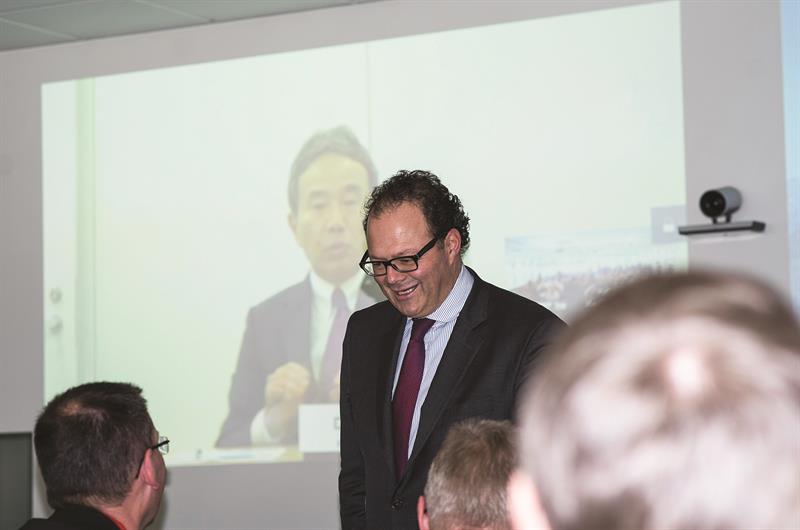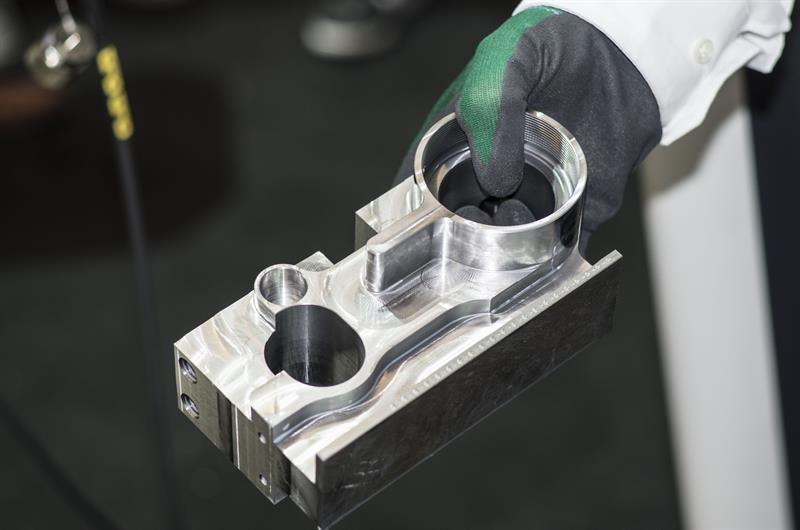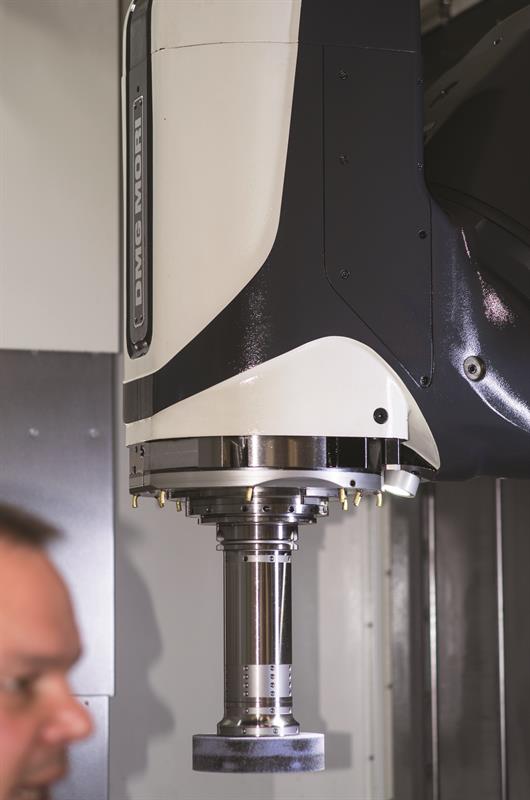Six months after the deal solidifying control of Germany’s DMG Mori AG by Japanese firm DMG Mori Co Ltd took effect, and three after it announced plans to shut down its Dixi machine tool factory, sell off its Tobler chuck and Gildemeister energy businesses, the German firm is reborn.
“By concentration on the core business with machine tools and services, DMG Mori set the course for the future,” it said in an early February press release on 2016 results (sales were down slightly, compared to 2015; orders were up 4%).
As of January, DMG Mori AG is in charge of sales and service for Germany, EMEA, India and China; “The new structure ensures fast decisions to suit markets,” it said. Parent company DMG Mori Co Ltd is responsible for the rest of the world.
Across the DMG Mori brand, prices for service and spare parts have been cut – “dramatically”, said Dr Masahiko Mori, president of DMG Mori Co Ltd. He was speaking by video link from Japan to a press conference at the Deckel Maho factory Open House in Pfronten, Germany, in February. At that event, and in person, Christian Thönes, chairman of the DMG Mori AG executive board, said: “At the beginning, I couldn’t believe we should reduce spare parts prices so much. It was really a challenge for me. It wasn’t just a bold decision; it was a necessary decision... And the good thing is that service turnover is doing better, because, of course, our customers like to buy with us again. We got things wrong in the past; sorry for that.”

Christian Thönes chats with journalists before the press conference; Dr Mori is on the video-conferencing screen behind
DMG MORI’S NEW SERVICE OFFERING
Here are some details: service call-outs have been made fixed-price; spindle pricing is new – an 18,000 rpm SK 40 spindle repair starts at £8,000 and a new replacement is double that; a ‘best price guarantee’ will refund the difference between DMG Mori’s price for OEM spare parts and others’, provided the gap is at least 20% cheaper; part pricing online (https://is.gd/nucepa) now includes shipping; new machines can be bought with a full service contract covering spare parts and labour, and which even insures against spindle crashes.
During the press conference, Thönes said that the new levels of cooperation with DMG Mori Co Ltd has imbued the firm with enthusiasm. It has also slightly altered the company’s outlook. He explained: “We are creative in Europe, but sometimes we overdo it. It’s great that we drive digitisation, but that’s not the main customer focus. This is what the press says. Of course customers want to be innovative and become digital, but first of all customers want their machines to run 24 hours [a day]. They want to be able to benefit from new technology cycles.”
Mori amplified these remarks by quipping: “yes, we are changing about a bit”. He added: “Sorry to say this in front of so many professionals, but we need to work more on accuracy, reliability and stability of the [German] machines. In [DMG Mori Co’s] case, our customers are using our machines [for] at least 10 years, sometimes 20, 30, 40 years, so we have to focus more [on] the content of the machines, including the mechanical production, peripherals and the software inside the machines.”

For example, one of the three new machine launches at the event, the ‘DMU 50 3rd Generation’ 5-axis vertical machining centre incorporates a speedMASTER spindle (in standard specification: 15,000 rpm/21 kW/111 Nm) that is becoming standard across the company’s product range. Thönes said: “We both [he and Dr Mori] said that we needed more accuracy. That’s why we decided to assemble the monobloc spindle here [in Pfronten].” He also offered the cost of the 650 by 520 by 475 mm (X, Y, Z) capacity machine as €164,900 (£140,000).
Another new machine launch is in the new budget CLX lathe series. The 51 mm bar capacity, 530 mm Z-axis capacity CLX 350 slant-bed machine has a maximum turning diameter of 320 mm. Its 12-station turret can run driven tools as an option. (The third world première was the Lasertec 75 Shape laser ablation system for die and mould work; workpiece capacity is 840 mm diameter by 520 mm height).
Automation, whether as production cells, pallet or tool handling, has also had a post-merger shake-up; changes, as yet unspecified, are afoot for the DMG Mori Systems turnkey machine integration business based in Wernau and Hüfingen, Germany. The former was due for a 2,700 m² technology centre in 2016. Instead, Thönes said: “All of our knowledge on automation will be transferred to the plants. We will change the structure. Automation will be all-important if you want to sell a machine tool in the future.”
In Pfronten, automation at both ends of the scale was demonstrated. At one extreme was a 24-pallet, two-level linear pallet pool system (LPP24) shown feeding workpieces to the NHX 5000 and ‘DMC 60 H linear’ horizontal machines. At the other were several units of the portable ‘Robo2Go’ single-machine tending robot for lathes. Although this system, consisting of combined Fanuc robot arm and storage pallet on wheels, requires an engineer for initial set-up, modifications – including new parts, pallet grids and gripper offsets – can be programmed using a non-technical Celos app at the machine tool CNC unit. Robot capacity is 10, 20 or 35 kg. A glass panel protects the robot on one side, while on the two sides facing the machine operator a light curtain prevents the risk of injury.
Turning to software, new proprietary CADCAM plugins (called ‘Powertools’) simplify part programming for both lathes and machining centres. First, a ‘technology library’ saves, for example, hole sequences and tool technologies as features to be called up later, at which time the machine automatically applies cutting parameters. Machinery understands that this is already available for FeatureCAM software from Autodesk (0121 766 5544); versions for Siemens NX (0121 745 0300) and Esprit (CAM Supplies & Services: 0871 218 3001) are in development. Second, ‘CAM Agent’ claims to automate production of NC programs, based on component families in CAD. The company says: “Programs are automatically matched to existing tools and technologies even when changing machines.” Third, a new Adaptive Process system is said to be able to use a spindle-mounted probe to perform automatic in-process alignment of components and measurement recording, all from the control.
One third-party Celos-based ‘app’ to watch out for is Renishaw’s PowerProbe. Planned for launch at the EMO exhibition in Hanover in September (18-23), it displays touch-probe data in a visual manner that makes it easy to see trends, to help users see if the machine is holding tolerance. To do this, the software uses in-built cycles in a Siemens control.

A 'duoBlock' grinding cycle option
GRINDING CYCLES
New software cycles for internal, external, face grinding and wheel dressing (called ‘Grinding 2.0’) are just part of the new add-on package facilitating grinding, as well as milling and turning in a single operation, on standard DMU and DMC duoBlock 80, 125 and 160 machining centres; surface quality achieved is said to be 0.4 micron. Other elements include a sensor that detects contact between grinding wheel and dressing unit and a finer coolant filter to catch particles larger than 10 micron.
The day of the event, DMG Mori announced it has taken an 85% stake in German IT integrator start-up ISTOS. Thönes explained that the purpose of the 15-employee company is to deal with IT issues, including hosting and data analytics, as manufacturers connect machine tools to an IT network. He said its remit is “everything which has to do with data which is not running directly on the machine, because that’s part of our Software Solutions”. ISTOS is now canvassing for custom integration work, and will also work with DMG Mori’s Software Solutions department to develop some initial offerings at EMO (Hanover, 18-23 September).This article was published in the March 2017 issue of Machinery magazine.









